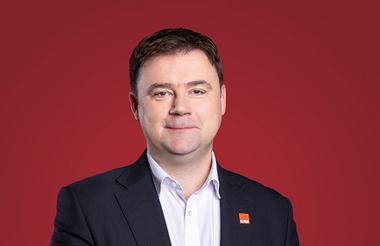Crisis chief executive Matt Downie is trying to get fit. He is in training for his own fundraising event, a 400-mile cycle from London to Edinburgh over seven days.
He describes the challenge as “terrifying” but says it could be a win-win as he aims to raise £10,000 to fund new services in the capital cities and get fit in the process.
“But I can say that in theory. When I get on the bike and I’ve got 400 miles to go, it might feel a bit different.”
Fundraising is one of the many areas Downie has had to get to grips with over the past 18 months since he was promoted to his first CEO role, after a decade working in charity policy.
The charity gets the vast majority of its income from public donations (£50.3m of £64.8m in the year to June 2022), which are becoming “much harder to come by” during a cost-of-living crisis that has also contributed to greater need for Crisis’ services than ever before.
It has been “a really difficult time to do the job”, Downie says, with the charity “not in a position to meet” the demand for its frontline services due to funding constraints. “We won’t give up on people, but my God is it hard to find housing and support for people.”
Switching career paths
Downie grew up in southwest London, where his parents owned a pub. When the pub “went bust”, they moved into council housing in a village in Norfolk. Downie says he disliked living outside of London – “as soon as I could, I came back down”.
His first charity sector role was at fellow homelessness support organisation Shelter, “opening the post in the finance team”. Money was Downie’s primary motivation for getting the job as he was struggling to afford accommodation himself at the time. But he “really liked working there, and thought it’d be a very good idea to train to be an accountant”.
After four years working at Shelter, where Crisis was seen as an “irritating cousin” by some staff, Downie became a management accountant at the National Autistic Society. It was there that Downie discovered his real passion.
“I would go out to local parent groups around the country, which are basically support groups for families with people with autism. On the face of it, they’re wanting some help with their finances. But actually, what emerged immediately was they really wanted help with fighting local authority and education decisions about their own kids.
“I went back to my boss at the time and said: ‘I think what they really want is to know how to campaign.’ So I wrote a campaigning guide, with the help of people whose job it was to do that, and just immediately discovered that that's really what my passion was.”
Downie moved to running the charity’s branch network of parent groups and then became its overall campaigns manager. He credits the charity for allowing him to switch departments “seamlessly”.
“I wonder today whether the charity sector would allow for that much lateral movement without donkey’s years of experience in something, or qualifications in things. And you see now the competition to work in charity campaigning. I would never have got this far in the world, particularly in the campaign space, today.”
Social change mission
Downie worked on what became the Autism Act 2009 – “an absolutely incredible campaign and groundbreaking piece of legislation”. The charity also ran a campaign to prevent autistic computer hacker Gary McKinnon from being extradited to the US. This campaign culminated in Barack Obama, during a BBQ at Downing Street with David Cameron, announcing that he would stop the extradition request. “I still pinch myself that you can get paid for doing that,” says Downie about his role in the campaign.
In 2010, he moved to Action for Children, where was director of policy and external affairs for four years Downie says he worked on some “incredible” campaigns at the charity, including for children in care to be given access to trust funds alongside financial education.
However, frustration with the charity’s limitations on its campaigning work eventually led to Downie moving on.
“It’s a very different organisation, runs hundreds of services under local authority contracts for local children. And the policy side of the work is completely dwarfed by that. Compared to Crisis, where there is kind of equal weight with services, at Action for Children, it was a very small part.
“I was definitely looking for an organisation that was as comfortable as I was, really, in terms of seeing the purpose of charities as being as much about the social change mission as it is the day-to-day delivery of assistance to people in the here and now.”
Lobbying ahead of a general election
But Downie says he enjoyed the challenge of changing public attitudes in his roles at the National Autistic Society and Crisis, where he was director of policy and external affairs for seven years before becoming CEO in January 2022.
“There can be a really fantastic coming together of a lack of political activity meets absolutely immovable need for that activity. And if you’ve got a really solid evidence base – as Crisis does around the scale of homelessness, the impact of homelessness, but most of all, the fact that there are practical solutions – things really can be done.
“I don’t think this organisation or most of the charity sector is at its best when it’s a protest movement. I think it’s at its best when we’re ruthless about the solutions we’ve got, when we put most of our energy into really compelling, practical and ambitious solutions for the systemic changes we need.”
Crisis was co-founded in 1967 by then-Conservative shadow chancellor Ian Macleod, who became the country’s shortest-serving chancellor in 1970 when he died suddenly after a month in office.
Macleod once said in relation to homelessness: “If there is to be a rivalry on this issue, let it be a rivalry of ambition.” Downie says this quote still informs the charity’s approach to lobbying.
“Instead of playing people off as ‘you don’t get homelessness’ or ‘you’re useless’, what we try and do is get people’s ambition to be better than the others.”
In the lead up to the next general election, Downie says his charity is speaking to all political parties, including those who may play a supporting role in a new government.
“We are maintaining good relationships with the SNP, with the Conservatives and with Labour already, because all three are in power. But the power brokers around that, particularly the Greens and the Lib Dems, they need solutions too.”
Confronting the instincts of government
In recent months, some in the sector have expressed concern over the government and Charity Commission’s attitudes to charities’ campaigning activity.
Downie says Crisis have generally been able to campaign with “no fear or favour” while remaining politically neutral but it has had to confront the government on a couple of occasions.
During the Covid-19 pandemic, the government was keen to reopen night shelters while Crisis warned that it was not safe to do so as it would be impossible to socially distance.
“So, we said that and the government said some nasty things about us on Twitter, which was a really unusual thing. But it didn't swerve us in any way. We were determined and clear that we had the evidence for what we were saying.”
A few years earlier, Crisis was contracted by the government to do some research into housing solutions. Downie says: “In the contract for it, it said that we mustn’t use the results of the research to lobby government. And I said to them: ‘That’s precisely what we’re going to do.’”
Crisis did lobby the government using the research findings, which then led to it receiving £28m to trial the Housing First policy in England.
“If we’d gone with the actual contract as it was first presented, we wouldn’t have done that. So, there are times when you have to confront the instincts of government to want to restrict what you do. But I’ve no intention whatsoever of us backing away from our cause. And in fact, quite the opposite.”
Working with smaller charities
Downie also says Crisis is “determined to unleash the power” of smaller charities it has worked with in the lead up to the general election.
During the Covid-19 pandemic, Crisis launched an emergency fundraising appeal which included raised £2m to distribute grants to smaller homelessness charities.
Crisis is not usually a grantmaking charity but became one temporarily as some smaller charities faced “existential risk”.
Downie says that he learnt through the programme that smaller charities want more than just funding from their larger peers.
“What it has taught me is that I think the bigger charities can do more to realise their supporting role for smaller ones and particularly on an issue like homelessness.
“Every town and every city has small, wonderful, precious organisations that are performing humanitarian heroics at a local level. And they not only need things like the grant scheme from time to time, what they say to me they most want is to join our campaigns and to know that they’re not just involved in amelioration of the issue, but they're part of a bigger, broader movement for saying that homelessness is not good enough.”
Staff, trustees and volunteers
Another focus for Downie is how Crisis supports its staff, volunteers and trustees.
He recently wrote for Governance & Leadership magazine about the charity’s work to include people with lived experience of homelessness in its decision-making. This includes the creation of an advisory board comprising 10 people with lived experience. Crisis has also now appointed two people with lived experience as trustees.
Staff at fellow homelessness charities Shelter and St Mungo’s have taken part in strike action over the past year in protest at pay offers from the organisations, with workers at the former accepting a revised agreement.
Downie says he is “confident that our staff feel well” and is “proud of our track record of working with our trade union colleagues” but he says that with pressures on the charity’s income and the cost-of-living crisis, “this year, it’s going to be harder than it’s ever been”.
“It needs to continue to be a frank exchange about the options that are available to an organisation that’s voluntary income funded. I don’t want to see particularly people on the lower grades disproportionately hit. And I think that probably this year, it’s worth considering what we can do more for people who are on lower grades than those who are on higher ones. Because the cost of rent has gone up and because cost of mortgages has gone up. We all know the issues that are out there as Crisis sees every day in our services.”
Downie says Crisis’ volunteers are “precious” and that the charity does “very well” in its recruitment of them, particularly around Christmas time.
He points to a picture in his office of Crisis’ services at Christmas in 1979. One man in the photograph still volunteers for the charity, more than 40 years later, now alongside his son.
“We have thousands of people who are incredibly dedicated. And I think our task is to unleash more of the power of volunteering particularly outside of Christmas. But that’s all potential that we can realise.”
Related articles












